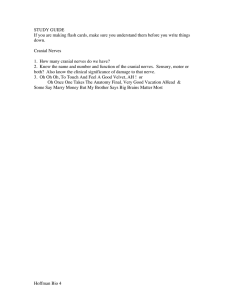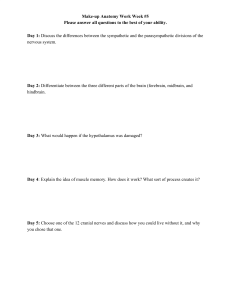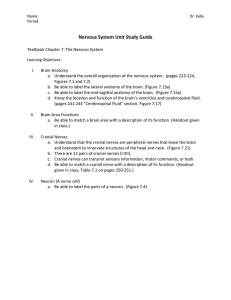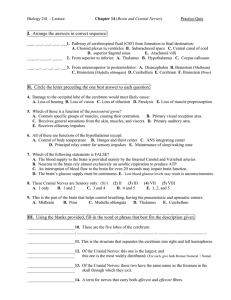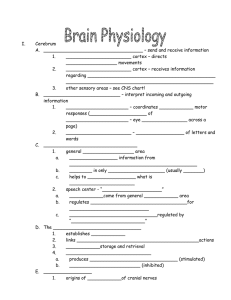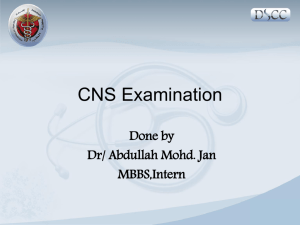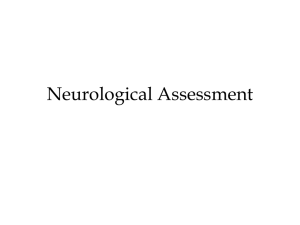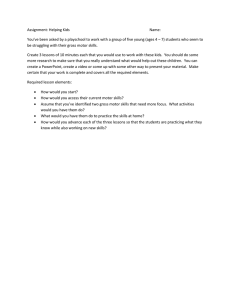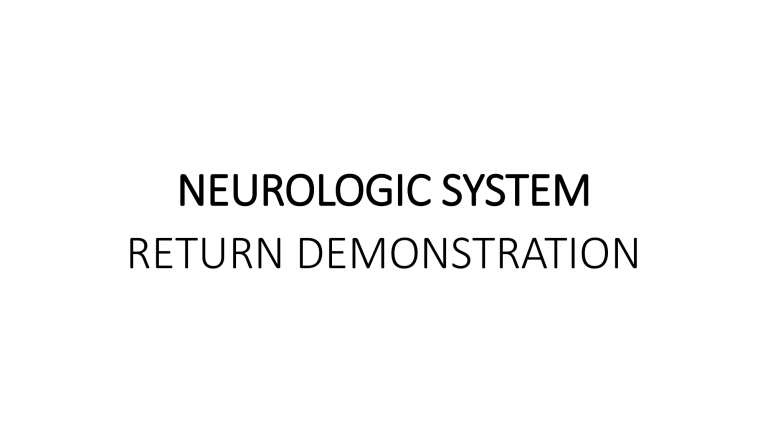
NEUROLOGIC SYSTEM RETURN DEMONSTRATION Introduction Good Afternoon Doc. Nika, I am John Linuel Tulliao, a student nurse from WUP and for today’s return demonstration, I will be performing the assessment of neurologic system. So maam can I proceed now? Goal The goal of this assessment is to assess the function of cranial nerves and detect any abnormalities. Introduce yourself The first thing we’re going to do is to introduce yourself, and verify the client’s identity. Identifying the patient ensures the right patient receives the intervention and helps prevent errors. Hand Hygiene Next is to perform hand hygiene and observe other appropriate infection prevention procedures.We should also wear some PPEs in order to prevent the spread of microorganisms. Client Privacy We should provide client privacy by closing the curtains, doors, or windows. Inquire Inquire if the client has any history of the following: Sir did you have a presence of pain in the head, back, and extremities, as well as onset and aggravating and alleviating factors, problems in speech, loss of consciousness, fainting, convulsion, trauma, tingling or numbness, tremors or tics, limping, paralysis, uncontrolled muscle movements, loss of memory, mood swings or problems with smell, vision, taste, touch, or hearing. Mental Status Level of Consciousness: Opens eyes spontaneously oriented Cognitive Function I have here some few questions that you’re going to answer. Sir can you tell what is today’s date? When is your birthday? What did you have for lunch? Patient is able to answer questions regarding recent, remote and intermediate memory. Cranial Nerves CN I (Olfactory): Can you close your eyes and identify different mild aromas? Cranial Nerves CN II (Optic): Can you read Snellen’s chart, and I’m going to check your visual fields by confrontation. Can you cover your left eye? How about your right eye? Cranial Nerves CN III and IV (Oculomotor and Trochlear): I’m going to assess six ocular movements and pupil reaction. Can you stare at the tip of this pen and follow its movements? Cranial Nerves CN V (Trigeminal): a. Can you look upward, I’m going to lightly touch lateral sclera of eye with sterile gauze to elicit blink reflex. b. To test light sensation, Can you close your eyes and I’m going to touch your forehead and paranasal sinuses by using a wisp of cotton. c. To test deep sensation, I’ll use alternation blunt and sharp ends of a safety pin over the same area. Cranial Nerves CN VI (Abducens): I’m going to assess direction of gaze. (We’ve already done this a while ago) Cranial Nerves CN VII (Facial): Can you smile, raise your eyebrows, frown, puff out your cheeks, close your eyes tightly. Can you identify various taste placed on tip and sides of tongue. Cranial Nerves CN VIII (Auditory): We’re going to do a whisper test, I’ll whisper some words and you’re going to repeat it. Can you cover your left ears, your right ears. Now, we’re going to use the tuning fork and please tell me if you hear the vibrations. Cranial Nerves CN IX (Glossopharyngeal): I’m going to apply tastes on posterior tongue for identification. Can you move your tongue from side to side and up and down. Cranial Nerves CN X (Vagus): I’m going to assess your speech for hoarseness. Can you please speak and say your name? Cranial Nerves CN XI (Accessory): Can you shrug your shoulders? Now, I’m going to apply some force and can you please resist it? and can you turn your head to the right and I’m going to apply some force again then you’re going to resist it. Can you turn your head to the left? Cranial Nerves CN XII (Hypoglossal): Can you stick your tongue out or protrude it at midline, then move it side to side Can you say “light, tight, dynamite,” and I’m gonna note that lingual speech (sounds of letters l, t, d, n) if it is clear and distinct. Motor Function Fine Motor Test for the Upper Extremities Motor Function Finger-to-nose Test Can you repeatedly and rhythmically touches your nose using your finger? Motor Function Finger-to-nose-and-to- the nurse’s finger Can you repeatedly touch you nose and my finger using your finger? Performs with coordination and rapidly able to perform with ease. Motor Function Fingers to fingers Can you repeatedly touch your finger? Performs with accuracy and rapidly Motor Function Fingers to thumb (Opposition) Can you touch each finger with your thumb with each of your hand rapidly? Motor Function Heel Down Opposite Shin Can you place the heel of one foot just below the opposite knee and run the heel down the shin to the foot. Repeat it with the other foot. You may also use a sitting position for this test. Gross Motor and Balance Tests Walking Gait Can you stand and walk without support? Gross Motor and Balance Tests Romberg Test Sways and able to maintain upright posture and foot stance Gross Motor and Balance Tests Standing on One Foot with Closed Eyes Can you please stand on one foot with your eyes closed? Able to maintain stance for 5 seconds Gross Motor and Balance Tests Heel-toe Walking Can you walk with your other foot’s heel on top of your foot’s toe? The patient was able to maintain heel-totoe walking around a straight line. Gross Motor and Balance Tests Toe or Heel Walking Can you walk with your toes? How about your heels? able to walk several steps on toes or heels Secure patient’s comfort and safety. Document all the findings Dispose PPEs Now, I’m going to dispose my gloves and put another spray of alcohol to prevent the spread of microorganisms. Thank you Thank you sir for cooperating and thank you Maam Nika for listening and for your time.
